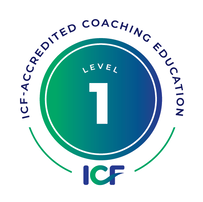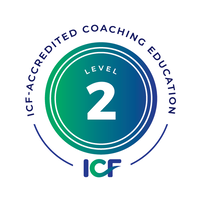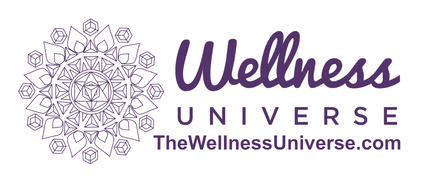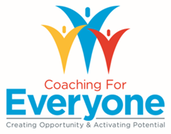|
Laurel Elders:
Hey, everybody. Our first LinkedIn live. I'm so excited. Welcome to Coaching Quips. These are weekly tips designed to equip coaches and future coaches with coaching mastery ideas to explore. I'm Laurel Elders, the founder of the Institute for Integrative Intelligence. I'm a master-certified coach with the ICF, and I'm excited to have with me today Bryant Alexander. Bryant is also a coach, and he works with us in admissions. We also have with us today Jill Aronoff. Jill is a leadership coach. She's with us to respond to questions in the chat. She's also going to be posting links as we go. All right, so, without further ado, we're just going to dive right in. Bryant, I just wanted to give you a chance to say hello and share a little bit about what you do. Bryant Alexander: Yeah, thanks. Thanks, Laurel. So, just a little bit about myself. I've been coaching for a while, specifically within the tech space. I help experienced tech professionals really define what freedom looks like for them, using their nine-to-five. But I also work with tech executives and tech founders and helping them become more effective leaders and build strong teams. So I'm glad to be here with you, Laurel. And I also want to add that I'm also a student at The Institute for Integrative Intelligence. So, Laurel is actually my instructor. So it's been a journey, and I'm just happy to share the platform. Laurel Elders: Thank you so much. I'm excited. So, today we're going to be talking about coaching versus advice giving and exploring just some key considerations. First of all, I just wanted to talk about coaching and really put some definition out there, just because there's so much misunderstanding. And coaching can be used as an umbrella term to just really put a label on just about anything nowadays. So, there are some clarifying distinctions that I found to be really helpful, and one of those is the metaphor of the two journeys. So, we found that in life, there are two journeys someone can take to reach their potential. That first journey, we can be shown the way. Someone can give us the book to read. We can take the classes, we can get mentoring. We've got counselors and therapists to guide us and show us the way. And what I found is that that gets us maybe this far. And it's that second journey that gets us the rest of the way to our potential and that nobody can show us. That's the self-discovered journey. And that's where coaching goes. True Coaching - what we're calling coaching - is taking someone through a self-discovery process that is self-directed and no other platform or approach that I know of takes somebody into that second journey and completely honors them as the expert and helps them develop their gifts from the inside out. Bryant Alexander: I agree 100% with that. I had that realization because I actually went through the therapy, like, just a lot of deep work as far as understanding what are my triggers? What is this thing that's bothering me? Or why do I feel like I can't move forward? And I think that guidance from the therapist got me to a point where it's like, all right, I understand the past, I understand those triggers, I understand what's setting me off. But now that I know how to manage that, how do I go about the future version of myself? And, even though I was working as a coach as well during the time, I had never actually worked with a coach before. And coaching was transformational for me because I think that if you claim to be a coach, you have to actually participate in it. But, uh, it was so transformational for me just because it helped me really create or put together the vision that I wanted to have for myself so I wasn't so stuck in those self sabotaging behaviors or like, this is just the way that I am and I understand this is how I'm wired. So it is what it is. It's like it gave me the space to say, all right, this is what's next for me, or this is the possibility of what growth can look like for me. Laurel Elders: Yeah, I love that. I was curious, when I was first learning coaching, I really struggled because I loved being able to provide answers and solutions. And so coaching in coach training, I learned when you provide an answer, you take away somebody's opportunity to self-generate. And that shift, that was so hard for me in the beginning. And we're talking about coaching mastery because, I mean, anybody can coach, but to masterfully coach is to really take someone into that second journey and not provide the advice and the answers. I'm just curious if you've experienced shifting that mindset. Bryant Alexander: I would say because I started in a traditional education space and I was doing a lot of advising, a little bit of coaching, but because it's a younger demographic, they need a little bit more context. So I carried that along for a while and thinking that, oh, this is masterful coaching, but in real life, it's just like one of the tenets that you all teach us is that your client is. You have to believe your client is well resourced, whole. Right. They have the ability to find the answers, uh, to their own solution. So even in my coaching today and understanding that tenant, it's like, I don't look to have the answers, because my answer isn't going to be what you're looking for, and you're less likely to really take ownership of what you want to do next if I'm just providing solutions. So I would say, yeah, I was stuck in more of a consulting advising role for the first couple of years in my early coaching, but I think the program has also just helped me put together, like, oh, uh, it's a way, it's masterful. If you really want to be a coach, to be masterful, it is truly to believe that the individual you work with has all the answers. It's just you're there to kind of put the guardrails up, to be like, all right, let's bring this back to you. What do you want to do, or what do you want helping them answer that question? So, took me a while, but I would say the program has definitely shed light on that for sure. Laurel Elders: Yeah, that was, um, big shift for me, too. Yeah, it took me a couple of years. I almost want to go back and apologize to my first clients. I'm so sorry. I didn't realize I was taking away your opportunities to find your own power and self generate, and I thought I was helping, but, um, now I know a better way. But I was thinking, too, about why do we just love giving advice? I've studied the brain and neuroscience, and we've reached this understanding that the brain is wired to provide answers or search for answers. We're not really organically, naturally wired to sit in curiosity unbiased, curiosity without judgment in honor of the direction the client is needing to go in. So I thought that was really fascinating. But also, this blew my mind. When I give, like, let's say, I slip up and I give my client advice because I get excited about a possibility. Well, who gets dopamine hit in the brain? Bryant Alexander: You do. Laurel Elders: Not my client! Yes, exactly. I'm excited. And they're like, "maybe". Bryant Alexander: I think I'm following you, but it's not for them. And you've been coaching for longer than I have, so I guess. Can you talk about an instance where you just knew, like, oh, "this is the shift I need to make"? can you talk about maybe a situation where it was just like, let me hold myself back from making this suggestion. Do you have an example in mind? Laurel Elders: Actually, one of my favorite examples is when I was hired as a consultant for business consulting, and I'd gotten to a point where I was just so in love with coaching. I just showed up that day. I was like, you know what? Why don't I just try to coach and see what happens first, and then I'll fill in the blanks, right? Because consulting - just to differentiate for those new to the distinctions - consulting is giving specialized advice. So it's perfect when there's missing information. But when it comes to somebody's self development or even creating something new, coaching is so profound. So I show up that day and, I made that agreement with myself, and I couldn't believe it. Zero consulting was needed that day. The client came up with way more brilliant answers than I ever could have just thought up on my own. Right. I'm not saying that is always the case, but it just showed to me that when we sit in honor of the client's truth first, it's powerful. It's really powerful. A powerful shift. Bryant Alexander: How was that day compared to any other day? You came in as the business consultant. How did you feel? How did the client react? What happened? What did you notice? Laurel Elders: Well, so, going back to what you said about the ownership piece, when someone is asked a question and comes up with an answer that's aligned and truly comes from within, there's ownership over you. And then - I also have a link to an article that Jill - we're going to be putting in the chat after this show. But research showed that when we're taking in advice, the brain offloads in a different way. The information doesn't really embed in the same way. So the brain goes into more of, like a neutral, and it doesn't embed into the neocortex while the advice is being given. And the consequence of that is ownership might happen later or maybe not at all. It was kind of left up in the air. But to engage the ownership and full integration, coaches are trained to ask powerful and meaningful questions that really engages the emotional and sensory side of the brain, not just the logical. And that's where ownership, inspiration, new skills start to develop. All of that exists through that process. Bryant Alexander: Well, I like to geek out about the science of coaching, too. I'm glad that you pointed that out. It's just not about, hey, these are about the feelings. This is, like, based in science. So I'm glad that you broke that down. It may have went over a few people's head, but I was like, yes. This is what gets me excited about coaching. Just how you can rewire the way somebody's brain is set up will help rewire or facilitate the process of rewiring the way somebody's brain is set up. For sure. Laurel Elders: Yeah, brain and heart, I would say, too, because we get, coaching, and people become so much more aligned with their core values, who they are, how they want to show up, what does integrity look like, what does it not look like? And all of that. Yeah, it's really whole person, which next week, we're going to be diving into a little bit more. Everyone, stay tuned for that one. So, I was just curious, before we wrap up, what inspired you to start learning more masterful coaching and the level two deeper dive coaching? Bryant Alexander: If anybody knows me or follows me. I've been coaching for a while, but I was actually running from coaching. And the reason that I was running away from coaching is because, I didn't like the emotional toll. Even though it gave me a lot of fulfillment, it gave me a lot of inspiration, it gave me a lot of, like, I love this. I didn't always like the emotional toll that kind of came with it, and that pushed me away from it. But I also saw, can I really make money with this thing? Because just, like, as a way to provide for myself, it's just like, is it possible to do this thing full time? Because I had never started a business before. I made money through working with organizations to be a coach. So what happened was it was probably like, it was actually like the year before last to where I have met Kevon Tucker, who is a masterful coach. I know he says PCC in his title, but he is a MCC for sure. And he exposed me to just what he's been able to do with coaching and tech. Like, he's worked for the Google, the Netflix, and all these other places. And even though I didn't immediately enroll in coaching, I just saw, just in our passive conversations, just like, how he talked about it, how he kind of bought back that enthusiasm to me. Because I had transitioned out of coaching, I was doing it part time, but I realized, oh, this is the thing that actually gives me energy. And I also had to learn how to hold space for myself and understanding. Like, I don't need to have all the answers and understanding. I needed to add more context to my experience or what it means to actually be a coach. So after working with the leadership coach, I realized, like, oh, this is something that I really care about. I had to kind of move out the way, like, all right, money, all right status, all right, title, like all these other things, I had to move all these things out the way because I realized coaching, it's kind of getting into the body, and we'll talk about it next week. But it gave me this feeling when I was working with people. It was like I was energized. I was like, when they had their aha moments, I would just be like, yes, that's it, that's it. Let's follow that, follow that. Tell me more about that. I would have these really just energetic moments, but then when I would do anything else, when it came to work, I was very low. I was very like, I don't really want to do this. So I say all that to say. I actually started to listen to my body more when I was actually facilitating a coaching session those little times in my job to where I actually got a chance to coach somebody I work closely with or coach a leader. And I had to say, like, all right, how long am I just going to hold this thing on the shelf? Because it's something that I'm good at, but I know there's a lot more context there. There's a lot more I need to learn in order to kind of sharpen my skills as a coach. And this is something, and I want to be a masterful coach. So that's why I decided to take the leap and say, like, all right, let's do this. We're going to go through an actual formal coach training program, because if anything, it's given just more context to the coaching that I was already doing and added to my skill set. So it's not really theoretical to me because now I'm able to go back and say, like, oh, here's what I did wrong. Here's what I did. Okay, here's what I did well. So it actually added to me just being a more masterful coach or moving in the direction of being a more masterful coach. But more importantly, it's just like, I just like to see the way inspire people to grow or inspire what their perception of growth could be for themselves, right? So just kind of like the science of it, the art of it, metaphors, like somatics, whatever that entails when it comes to coaching. That's what inspired me to come back to it and to actually go into a program because it's just like, it's not often you find something that makes you feel like that, and I think that you owe it to yourself to just see where it goes. It's not like final. Nothing is really final except death, as we know. But it's just like, well we don't even know that. We don't even know that. We don't even know that. I take that back. We don't even know that. But overall, it's just, you realize that you owe it to yourself. If you find that thing that gives you energy and that you just could do for free, dive into it, see what happens, and then take it from there. So that's what made me want to enroll at the institute. Laurel Elders: Yeah. I love that. I really resonate with what you're sharing, too. I originally thought when I went to coach training that I was going to learn some counseling skills, and I was blown away. I was like, oh, wait, we're not doing counseling. What else is there? Oh, there's this whole other approach. Totally mind blowing. Yeah. So fascinating. Well, thank you so much. This has been so fun. And, we are going to be doing these coaching quips in coaching mastery. We're going to really focus on coaching mastery every week, and we hope that they are a lantern to your path if you're a coach or a future coach. I always found that people feel called to coach when something inside of them is ready to awaken. Sometimes they know what that is, and sometimes it's just an inkling. So I also invite you to consider this week if you're feeling called to step further into coaching, what inside of you is ready to awaken. And if you are an individual or an organizational leader seeking to bring coaching into what you do, reach out to Bryant here on LinkedIn. You can connect with him directly here, and we've got a plethora of options to support your journey into coaching excellence. Our mission is to elevate human potential through both the art and the science. Bring that science piece in. That's important. The art and the science of masterful coaching. Thank you so much for joining us, and we hope to see you next week. Bye for now. Bryant Alexander: Thank you all. See you. Bye.
0 Comments
Leave a Reply. |


 RSS Feed
RSS Feed





